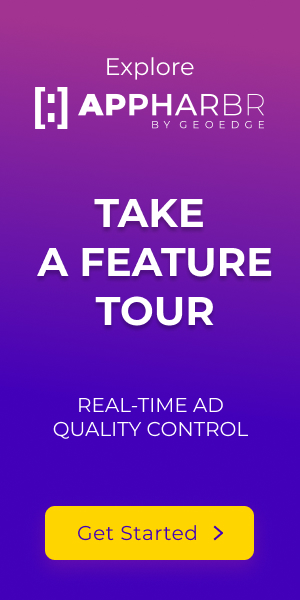App Stores, the central hubs for applications, have become battlegrounds for user attention, where ad quality can make or break an app’s success. App Store Optimization (ASO) efforts are a cornerstone for app visibility, but ad quality issues pose a serious threat.
Ads that are especially disruptive push players over the edge – unskippable ads, ads without “X” buttons, malfunctioning creatives, ads that autoplay sound, and ads with explicit content. When players encounter these ads, they often downvote the app, sending it into the lower depths of app store rankings.
The Impact of Bad Ads on User Engagement and Revenue
ASO is crucial, with over 70% of app store visitors using organic search to find apps. Yet app store optimization is no easy feat among 2.7 million apps in the Google Play Store and 1.85 million in the Apple App Store. This underscores the need for app developers to prioritize ad quality not only as a component of user experience, but as a strategic element of ASO.
Negative reviews in the App Store have an effect on an app’s visibility and download rates. App Store algorithms, when factoring in user ratings and reviews, can demote apps plagued by poor ad feedback which reduce their discoverability. Ads with multiple end cards, or those that deadlock users, lead to serious disruptions in player experience. App publishers who ignore aggressive advertising tactics see a 20% decrease in user engagement and a subsequent 10% drop in in-app purchase revenue. This reinforces a vicious cycle – poor ad quality damages player experience, causing churn and negative reviews, which leads to decreased visibility and fewer downloads.
User Frustration and App Reviews
The cycle of negative feedback and diminished ASO can be self-perpetuating. As an app’s ranking falls due to poor reviews, its ability to attract new users and positive experiences diminishes, entrenching it in a lower tier of visibility.
App publishers’ first step towards avoiding low app ratings is preventing intrusive or excessively disruptive ads. To what extent do disruptive and intrusive ads impact user frustration and app abandonment?
- 71% of users are likely to uninstall an app due to intrusive and disruptive adsuser frustration and app abandonment.
- 93% of app developers acknowledge that bad ads result in negative App Store reviews.
- 57% of gaming app publishers claim that bad ads cause players to stop playing.
Fighting Unskippable Interstitials
AppHarbr researchers analyzed user complaints across millions of App Store reviews. Among the top complaints: unskippable interstitial ads that fail to load correctly, or those in which the ‘X’ button either doesn’t appear or doesn’t respond to clicks, resulting in ads that are too long or ‘unskippable’.
When there is no visible close button on an ad, users must choose between clicking on the ad or closing the app altogether, causing a bounce for the app developer. AppHarbr’s Autoclose Interstitial feature is integrated through an SDK, which means it operates seamlessly whenever an app is running, helping app publishers reduce bounce rates and user churn. This solution serves as a control when interstitials malfunction, or when their close buttons are unresponsive or obstructed.
With this feature, publishers and developers set a time limit threshold, and AppHarbr automatically closes the ad if it remains open beyond that threshold. This prevents user churn and ensures that the session can continue uninterrupted. Even in the case of malfunctioning ads, AppHarbr allows an app to continue to monetize with interstitials, while communicating impressions to the ad server without risking user loss.
Future-Proofing Apps Against Negative Reviews
For publishers who opt to filter bad ads on mediations, plugging and unplugging networks simply won’t cut it. AppHarbr’s solutions enhance player experience by providing real-time ad quality control, allowing developers to proactively filter ads without interrupting monetization.
AppHarbr enables control via
- Pre-set times for unskippable ads with predefined time limits that force-close ads after a set time duration.
- Automatically mutes ads that autoplay sound.
- Bypasses traditional advertiser self-categorization to verify the true nature of ads, ensuring they align with audiences and app content.
AppHarbr supports immersive player experience by offering developers customizable controls over their ad displays, significantly reducing the likelihood of negative ad-related feedback by 80%.
By integrating AppHarbr, app developers go beyond addressing current user complaints. They future-proof their apps against threats to the evolving digital advertising landscape. Ensuring a proactive approach to ad quality is essential for apps to uphold a positive reputation, drive user engagement, and foster growth.




